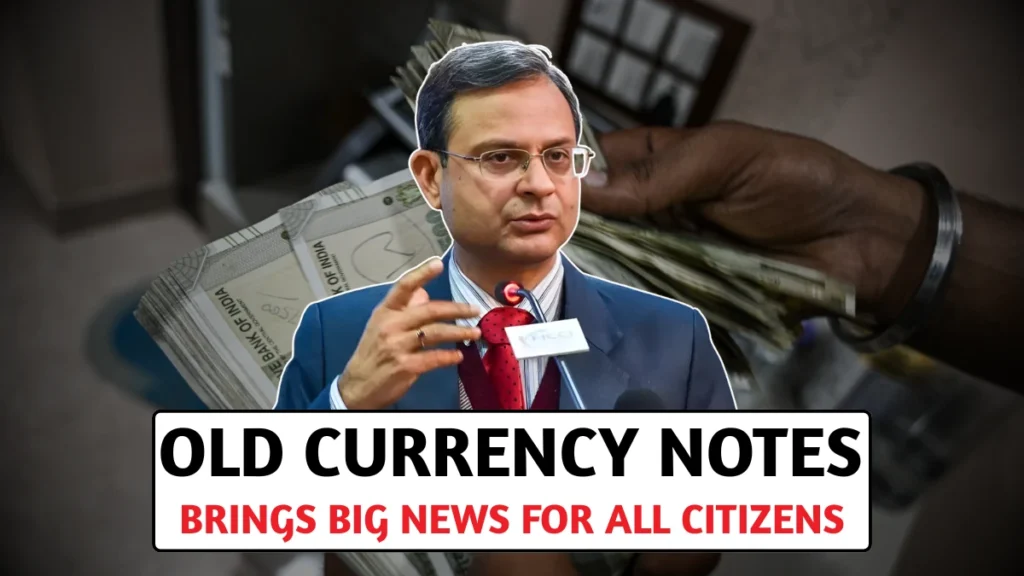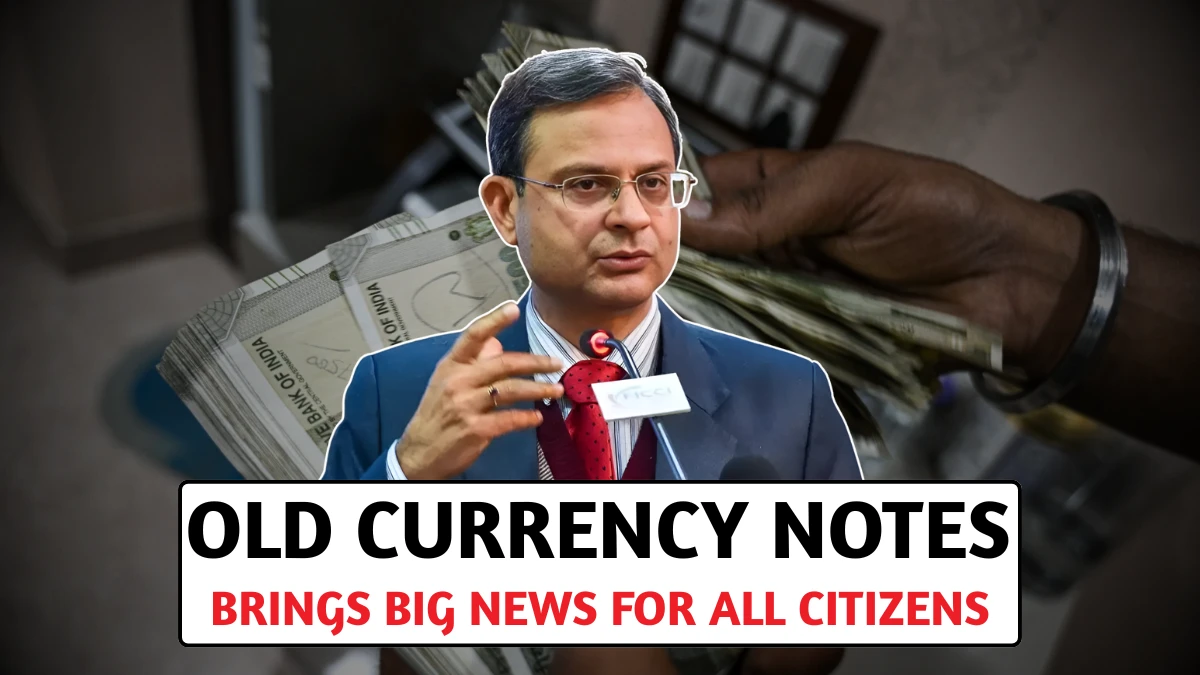Old Currency Notes: The Reserve Bank of India (RBI) has recently issued a new set of rules regarding the exchange and usage of old currency notes in the country. This rule marks a significant shift, especially for those who still hold demonetized notes or old currency in their possession.
In this article, we will dive deep into these new guidelines, how they affect citizens, and what steps people need to take to stay compliant with the latest regulations.

New RBI Rule on Old Currency Notes
The RBI has always been at the forefront when it comes to managing the nation’s monetary policy, and the new rule regarding old currency notes is just another example of how the institution ensures smooth currency flow and strengthens the Indian economy. While demonetization in 2016 was a historic moment, many people still possess older notes, especially the Rs 500 and Rs 1000 denominations that were invalidated during the move.
The new guidelines issued by the RBI provide clarity on what citizens can and cannot do with old currency notes. According to the new rule, citizens are now allowed to exchange these demonetized notes at select RBI offices, but there is a catch. The exchange is only allowed under specific conditions and with certain documentation, making it crucial for the public to understand the full scope of these regulations.
How the New Rule Affects Citizens
For those who have been holding onto old currency notes in the hopes of one day exchanging them, this new rule is a mixed bag of opportunities and limitations. On the one hand, citizens are given a final chance to exchange their old notes at designated RBI offices. However, the window for this exchange is limited, and there are strict conditions in place.
One of the primary conditions is that individuals must have valid reasons for possessing the old currency. In most cases, people who are found with large amounts of demonetized currency without proper justification may face scrutiny. This ensures that the exchange process is not abused and that only those with legitimate reasons are able to benefit from this new rule.
Steps to Exchange Old Notes
If you are someone who still has old currency notes and wishes to exchange them under the new rule, it is important to follow the official process. The RBI has set up specific offices where the exchange will be allowed, and citizens must visit these locations with the necessary documents. These documents typically include proof of identity, address, and a reason for holding the demonetized notes.
The exchange process itself will follow a set of formalities, and the staff at the RBI offices will guide individuals through the procedure. It is crucial to note that the RBI will not accept old notes for exchange beyond the stipulated timeframe, so it is important to act quickly if you wish to take advantage of this opportunity.
Why the RBI Made This Decision
The decision by the RBI to allow citizens to exchange old currency notes comes after years of deliberation and feedback from the public. Many people were left with old notes after demonetization, and the new rule is a response to the lingering concerns regarding the currency status of those notes. The RBI has emphasized that this decision is part of its broader strategy to streamline the circulation of currency in the economy.
Additionally, this move also helps the RBI monitor the flow of currency more efficiently. By creating a designated period for the exchange of old notes, the central bank ensures that there is a clear record of where the notes are going, which can help in curbing illegal activities and strengthening the transparency of the banking system.
The Implications for the Economy
The reintroduction of old notes into the formal economy has several implications. First, it helps reduce the amount of unaccounted or black money circulating outside the formal financial system. By encouraging people to exchange their old notes, the RBI hopes to bring back large amounts of money into the formal banking sector. This could potentially increase liquidity and contribute to the growth of the economy.
On the other hand, it could also help reduce inflationary pressure. When old notes are exchanged for new currency, it ensures that the money supply is better controlled. As more people deposit their old currency, it decreases the amount of physical cash circulating in the economy, thus helping to stabilize prices.
The Challenges of Implementing the New Rule
While the new rule offers an opportunity for citizens to exchange their old currency, there are challenges in its implementation. One of the main concerns is the sheer number of people who may still hold old notes. With millions of people potentially visiting RBI offices to exchange their old currency, there could be significant queues and delays.
Additionally, the documentation required to exchange the notes may create complications for some individuals, especially for those who lack the necessary paperwork or are unaware of the process. The RBI must ensure that the exchange process is as smooth and efficient as possible to avoid unnecessary inconvenience for the public.
Public Response to the RBI’s Rule
The public response to the RBI’s new rule has been a mixture of optimism and caution. While many citizens are relieved to have another opportunity to exchange their old currency, there are concerns about the practical aspects of implementing this rule. Some people have expressed worry about the limited exchange period, while others are concerned that the necessary documentation might be too burdensome for certain individuals.
Despite these concerns, the general sentiment is positive, with many believing that this is a fair and transparent way to handle the old currency issue. In particular, people who were left with demonetized notes due to genuine reasons such as inheritance, legal settlements, or other legitimate causes are appreciative of the RBI’s efforts to provide a solution.
What Lies Ahead for Citizens with Old Notes
Looking ahead, it is clear that the new rule by the RBI will have a lasting impact on those who hold old currency notes. While this may be the final opportunity to exchange old notes, it also serves as a reminder of the broader economic and policy changes that have taken place since demonetization. For many citizens, this rule will mark the end of an era and the final chapter in a long saga of currency reform in India.
As with any significant policy change, there are bound to be challenges and setbacks along the way. However, the RBI has shown a commitment to ensuring that the process is as smooth and transparent as possible. Citizens are advised to stay informed about the new regulations and follow the necessary steps to take advantage of this opportunity before the exchange window closes.
Conclusion: A New Era of Currency Exchange
The RBI’s new rule regarding old currency notes is a crucial step in the country’s ongoing efforts to manage its monetary policy and strengthen the economy. It offers citizens a final opportunity to exchange demonetized notes, but with clear guidelines and strict documentation requirements. While there are challenges in implementing this rule, it marks a significant milestone in India’s currency reform journey. Citizens must act swiftly and responsibly to ensure they don’t miss this last chance to exchange their old notes, securing their place in a rapidly evolving financial landscape.
Disclaimer
The information provided in this article is based on the latest guidelines issued by the Reserve Bank of India (RBI) at the time of writing. Please note that the rules and regulations discussed may be subject to change, and readers are encouraged to verify the latest information from official sources such as the RBI’s website or authorized government notifications. This article is for informational purposes only and does not constitute legal, financial, or professional advice. The author and publisher do not accept any liability for actions taken based on the content of this article.
